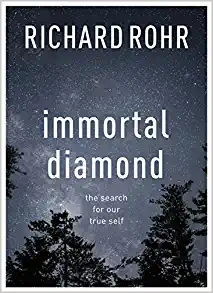This Tuesday, we will be discussing Chapter 5 “Thou Art Thou.” of Richard Rohr’s book Immortal Diamond: The Search for Our True Self. Chapter 5 is the linchpin of Rohr’s book. It begins with the reality of the Incarnation of God in Christ as the universal representative of all humanity and ends with our participation in the Incarnation which reveals the image and likeness of God (Gen. 1:26) in which we were created and thereby we ourselves become a Son of God (Gal. 4:5). The Incarnation and Participation is the central message of the Christian story. The Catechism of the Catholic Church, paragraph 460, tells the centrality of the Incarnation most succinctly:
“The Word became flesh to make us ‘partakers of the divine nature’ (2 Pet. 1:4): ‘For this is why the Word became man, and the Son of God became the Son of man: so that man, by entering into communion with the Word and thus receiving divine sonship, might become a son of God.’ (Irenaeus) ‘For the Son of God became man so that we might become God.’ (Athanasius) ‘The only-begotten Son of God, wanting to make us sharers in his divinity, assumed our nature, so that he, made man, might make men gods.’ (Aquinas).
In other words, the existential gap between the Divine Reality and our Human Condition is closed only through the union of the Human and the Divine in Jesus Christ. And in the closing of that gap, we find our True Self.
Rohr also wants us to grasp the cosmic significance of the Incarnation in light of the Trinity. For me, the significant understanding that Rohr puts on this relationship is that God as Trinity is not a noun but a verb. p.98. John tells us that God is Love. 1 John 4:8. Love is not a noun but an action verb. The Father is the Lover, the Son is the Beloved, and the Spirit is the Love flowing between them. In the Incarnation, Jesus unites this Divine Ever-flowing Love with our humanity and therefore that Love flows through us as well. And as we participate in this Divine Love, the Immortal Diamond is revealed.
If you have time this weekend, I commit this blog post from Fr. Stephen Freeman entitled “You’re Not Doing Better.” (Fr. Freeman grew up Southern Baptist in Greenville, became Episcopalian in college and was ordained a priest, and then converted to Russian Orthodoxy.) In this article, he writes how we find the “true self” not in moral improvement but with our participation in the Incarnation.
Dinner at 6. The menu is Muffuletta Sandwiches. Discussion about 6:45. Hope to see you here!
For it was for this end that the Word of God was made man, and He who was the Son of God became the Son of man, that man, having been taken into the Word, and receiving the adoption, might become the son of God. For by no other means could we have attained to incorruptibility and immortality, unless we had been united to incorruptibility and immortality. But how could we be joined to incorruptibility and immortality, unless, first, incorruptibility and immortality had become that which we also are, so that the corruptible might be swallowed up by incorruptibility, and the mortal by immortality, that we might receive the adoption of sons?
Irenaeus of Lyon (130-202) Against Heresies (Bk III, Ch. 19)


Pingback: 2 Peter 1:1-4, Theosis – Ancient Anglican